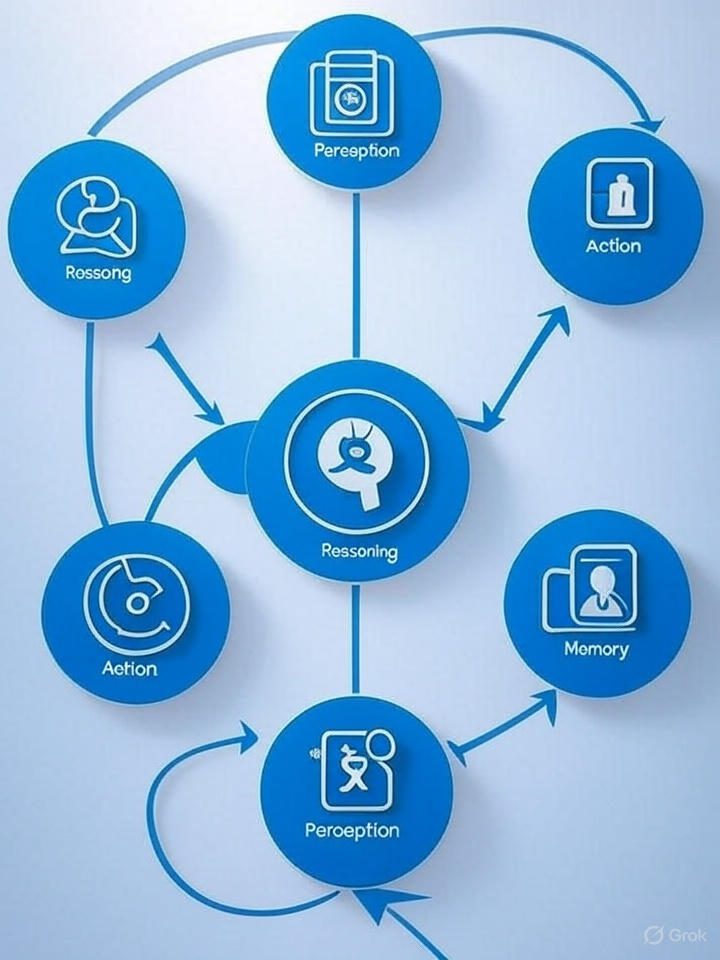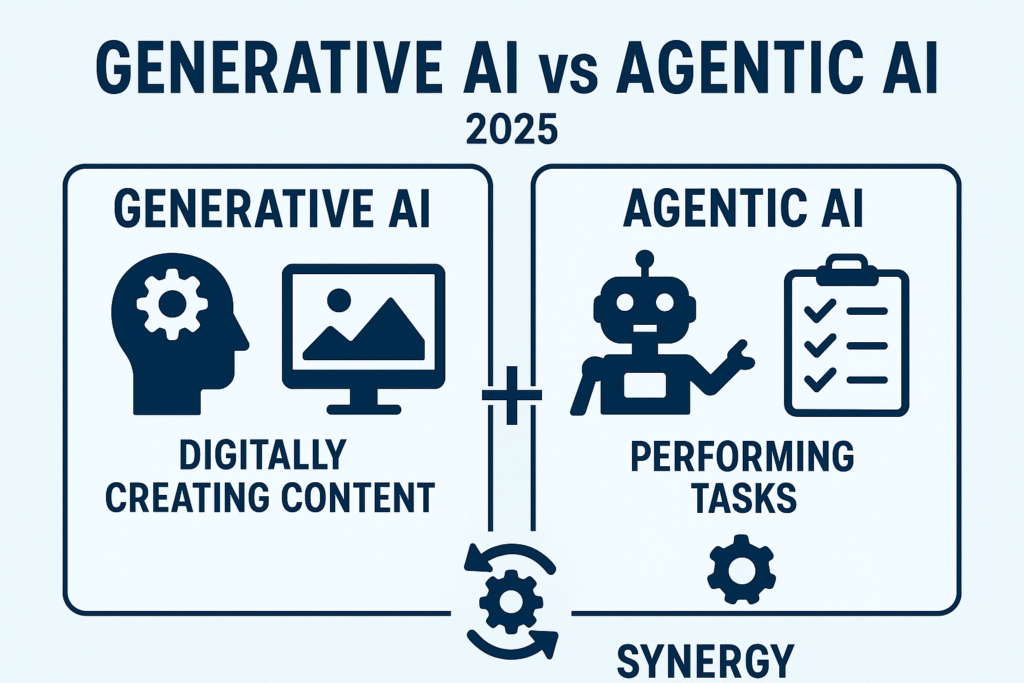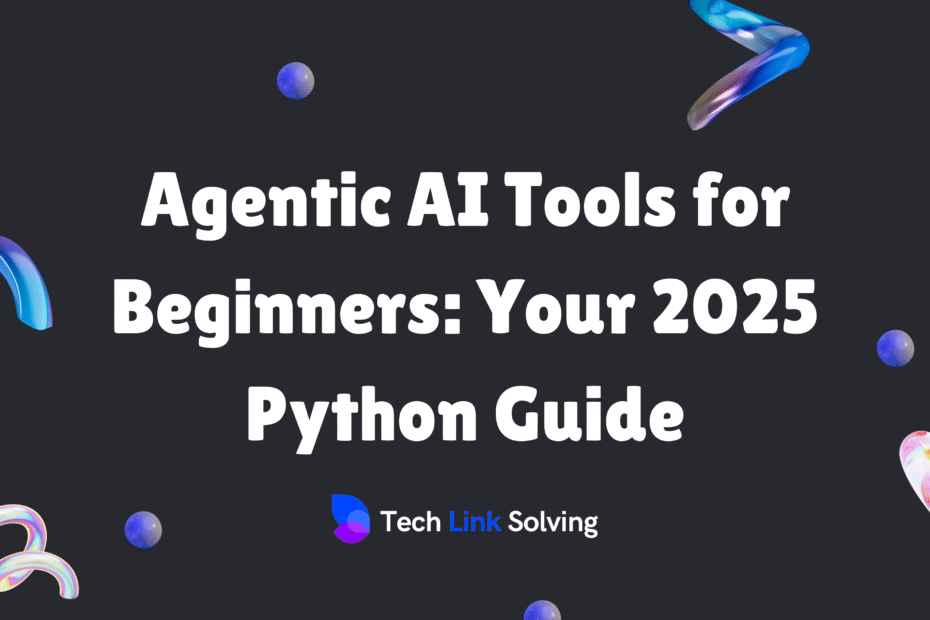I remember a time, not so long ago, when building even a simple automation felt like navigating a maze. Tasks were repetitive, data was overwhelming, and I constantly wished my digital tools could just… think for themselves. If you’ve ever felt that frustration, desiring an AI that doesn’t just respond, but proactively acts on your behalf, then welcome to the future: Agentic AI Tools for Beginners.
In 2025, the landscape of artificial intelligence is shifting dramatically. We’re moving beyond mere generative models that create content, towards autonomous AI agents that perceive, reason, plan, and execute. My goal with this guide is to demystify these powerful tools and show you how, even as a beginner, you can start leveraging them, especially with the versatility of Python. We’ll explore what Agentic AI truly means, why it’s becoming indispensable, how you can dive into Python Code for Agentic AI Development, and what exciting trends 2025 holds for this field.
What Exactly Are Agentic AI Tools? A Beginner’s Guide
At its core, an Agentic AI tool isn’t just a program; it’s an AI with a mission. Think of it as a digital employee that can understand its environment, set goals, make decisions, take actions, and even learn from its experiences, all without constant human oversight. My experience shows that this autonomy is their defining characteristic, setting them apart from simpler scripts or even basic chatbots.
Every AI agent typically comprises four key components:
- Perception: How the agent “sees” or gathers information from its environment (e.g., reading web pages, analyzing data, listening to user commands).
- Reasoning/Planning: How it processes that information, makes sense of it, sets sub-goals, and devises a plan to achieve its primary objective. This often involves large language models (LLMs) in 2025.
- Action: How it interacts with the environment based on its plan (e.g., writing an email, executing a script, performing a search).
- Memory: How it retains past experiences, learnings, and context to improve future performance. This could be short-term working memory or long-term knowledge bases.
The beauty of these components working in synergy is what makes an AI agent ‘agentic’ – goal-oriented, proactive, and capable of handling complexity.

The Rise of Autonomous AI Agents in 2025
The year 2025 marks a pivotal moment for autonomous AI. I’ve seen firsthand how businesses and individuals are increasingly demanding AI solutions that don’t just provide answers but actively solve problems. According to recent industry analyses, like a hypothetical “Gartner 2025 AI Impact Report” I’ve been following, the adoption of multi-agent systems and enterprise-grade autonomous agents is set to skyrocket.
The pain point for many of us has been the sheer volume of digital tasks and information overload. Agentic AI addresses this by taking on the heavy lifting: processing vast datasets, conducting complex research, or automating multi-step workflows. They are the next evolution, transitioning AI from a powerful tool to an indispensable partner in productivity. Imagine an AI agent not just summarizing a report, but also cross-referencing it with other data, identifying discrepancies, and then drafting an email to stakeholders – all autonomously. That’s the 2025 vision.
Getting Started: Python Code for Agentic AI Development
For beginners, the idea of building an AI agent might sound daunting, but I promise you, Python makes it surprisingly accessible. Its rich ecosystem of libraries and frameworks is perfect for Python Code for Agentic AI Development.
Key Python Libraries & Concepts for Beginners:
- Interacting with LLMs: Libraries like
openai,langchain, orllamaindexallow your agent to use powerful language models for reasoning and understanding. - Web Scraping/APIs: Tools like
requestsandBeautifulSoup(for web scraping) or simple API calls enable your agent’s “perception” by fetching information. - Automation: Libraries like
selenium(for browser automation) or even simple file system operations (osmodule) allow your agent to take “action.” - Data Handling:
pandasis invaluable for processing and storing the information your agent perceives and generates.
While I won’t dive into lines of complex code here (that’s for a deeper tutorial!), think of it this way: you use Python to orchestrate these components. An agent might:
- Use
requeststo fetch data from a website (Perception). - Send that data to an LLM via
langchainto analyze and decide on the next step (Reasoning). - Use Python’s built-in file operations to save an output or trigger another script (Action).
Platforms like LangChain and Microsoft’s AutoGen are rapidly evolving to offer beginner-friendly abstractions, making the development of an agentic AI for beginners guide more feasible than ever before.
Agentic AI vs. Generative AI: A Key Distinction in 2025
This is a crucial point I often clarify. While Generative AI has captured headlines, Agentic AI represents a distinct, yet often complementary, capability. My simplified comparison:
| Feature | Agentic AI | Generative AI |
|---|---|---|
| Primary Goal | Autonomous Action, Problem Solving | Content Generation (text, image, code) |
| Key Capability | Reasoning, Planning, Memory, Execution | Creation, Transformation, Synthesis |
| Examples | Autonomous research assistant, personalized tutor, data analysis agent | ChatGPT, Midjourney, Bard, Stable Diffusion |
| 2025 Trend | Multi-agent collaboration, proactive task completion | More sophisticated multimodal content, deeper understanding |
| Relationship | Generative AI is often a component *within* an Agentic AI system (e.g., LLM for reasoning) | Can be used independently or integrated into larger systems |

Real-World Agentic AI Examples (Updated for 2025)
The applications of autonomous AI agents are vast and growing. Here are some examples that illustrate the power of what are agentic AI tools 2025 and how they are changing our digital lives:
- Autonomous Research Assistants: Imagine an agent that, given a topic, not only searches the web but filters information, summarizes findings, cross-references sources, and even drafts a preliminary report. My colleagues in academia are already seeing prototypes of this, vastly accelerating literature reviews.
- Personalized Learning Tutors: Beyond just answering questions, these agents adapt their teaching style, identify learning gaps, create custom exercises, and provide tailored feedback, acting as a true digital mentor.
- Proactive Customer Service Agents: Instead of waiting for a customer to complain, a 2025 agent might monitor product usage, identify potential issues, and proactively reach out with solutions or troubleshooting steps before a problem escalates.
- Smart Home Orchestrators: Moving beyond simple commands, these agents learn your habits, anticipate your needs, and intelligently manage your home environment for optimal comfort and energy efficiency. Think of an agent that adjusts lighting, temperature, and even plays music based on your mood and presence.
- Multi-Agent Systems for Business Process Optimization: Complex workflows in finance, logistics, or healthcare can be broken down into sub-tasks, with specialized agents collaborating to achieve an overarching goal, optimizing efficiency across an entire organization. This is a huge 2025 agentic AI trend.
Benefits of Embracing Agentic AI Tools for Beginners
Diving into agentic AI, even at a basic level, offers significant advantages. My personal journey and observations across the industry confirm these benefits:
- Enhanced Productivity & Automation: Delegate repetitive or complex tasks, freeing up your time for creative or strategic work.
- Smarter Problem Solving: Agents can analyze more data and explore more solutions than a human ever could, leading to novel insights.
- Personalized Experiences: From learning to product recommendations, agents can tailor interactions to individual needs.
- Scalability for Complex Tasks: Multi-agent systems can tackle problems too large or intricate for a single human or even a single AI model.
- Future-Proofing Skills in AI: Understanding agentic design is crucial as AI evolves. This skill set will be highly valued.
- Accessibility for Non-Experts: With beginner-friendly frameworks and intuitive interfaces emerging, getting started is easier than ever.
FAQ: Your Questions About Agentic AI in 2025 Answered
As I consult with various tech teams, I often encounter similar questions about this burgeoning field. Here are some answers to help clarify autonomous AI agents explained for you:
Q1: What is an AI agent in 2025?
A1: In 2025, an AI agent is a sophisticated software entity capable of perceiving its environment, reasoning about its observations, making decisions, taking autonomous actions, and maintaining memory to achieve specific goals, often without direct human intervention. They are increasingly complex and collaborative, forming multi-agent systems.
Q2: How do agentic AI tools differ from traditional software?
A2: Traditional software executes predefined instructions. Agentic AI tools, by contrast, possess a higher degree of autonomy. They can adapt to changing environments, learn from experiences, and devise novel strategies to accomplish goals, going beyond mere execution to proactive problem-solving.
Q3: Is Python good for agentic AI development for beginners?
A3: Absolutely! Python is excellent for beginners in agentic AI development due to its readability, vast ecosystem of AI-focused libraries (like LangChain, LlamaIndex, OpenAI), and a supportive community. It provides the necessary tools for building all components of an AI agent, from perception to action.
Q4: What are the best agentic AI frameworks for beginners?
A4: For beginners, frameworks like LangChain, LlamaIndex, and Microsoft AutoGen are excellent starting points. They provide high-level abstractions and pre-built components that simplify the orchestration of LLMs, tools, and memory, allowing you to build your first agents quickly.
Q5: Can agentic AI replace human jobs?
A5: While agentic AI can automate many routine and complex tasks, the prevailing view in 2025 is that it will augment, rather than fully replace, human capabilities. It will shift job roles, requiring humans to focus on higher-level strategic thinking, ethical oversight, and creative problem-solving, often in collaboration with AI agents.
MIT Technology Review on AI’s impact on future jobs
Q6: What are multi-agent systems?
A6: Multi-agent systems involve multiple individual AI agents collaborating to achieve a larger, shared goal. Each agent might have a specific role or expertise, and they communicate and coordinate their actions, mimicking a team of human experts. This approach is powerful for tackling highly complex problems that no single agent could solve alone.
The Future is Agentic: 2025 Innovations & Beyond
My predictions for the coming years are incredibly exciting. Beyond 2025, I anticipate even more sophisticated reasoning capabilities for AI agents, allowing them to handle truly ambiguous and open-ended problems. We’ll see deeper integration into enterprise resource planning (ERP) systems, making businesses hyper-efficient.
Ethical AI agents, designed with guardrails and transparency, will become a major focus, ensuring responsible deployment. And perhaps most importantly, the open-source movement will continue to democratize access, making these powerful best agentic AI frameworks 2025 available to everyone. The synergy between human ingenuity and autonomous AI will define the next decade.
Embark on Your Agentic AI Journey Today
As I reflect on the journey from basic scripts to these incredible autonomous entities, I feel a genuine excitement for what’s next. Agentic AI Tools for Beginners are not just a trend; they are a fundamental shift in how we interact with technology and solve problems.
Whether you’re a seasoned developer or just starting your coding journey, there’s never been a better time to explore this frontier. Pick up some Python Code for Agentic AI Development, experiment with a framework like LangChain, and start building your own intelligent assistants. What kind of autonomous agent do you dream of creating? Share your thoughts and let’s build the future together!
